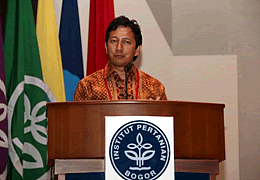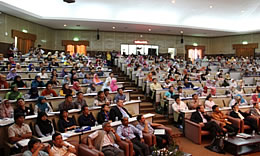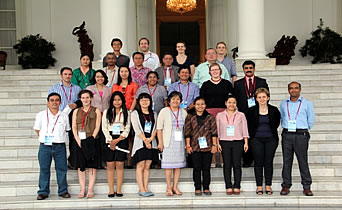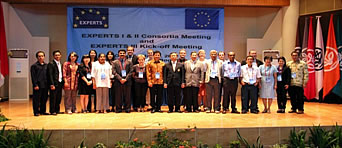- Details
- Category: 2012
Representatives of the EXPERTS Consortium met in Bogor, Indonesia for the EXPERTS I and II Meetings and EXPERTS III Kick-off Meeting on 29 October to 1 November 2012. The University of Göttingen, Germany, organized the meeting with the host institution, Institut Pertanian Bogor.

Mr. Netra Bhandari, International Programme Coordinator of the Georg August Universitat Goettingen in Germany, welcomed the participants to the meeting as well as over 300 students and faculty members from various universities in Indonesia who gathered at the Andi Hakim Nasoetion Auditorium to attend the EXPERTS Promotional Program during the opening day of the meeting.
 Present in the EXPERTS meeting were representatives from the 7 European partner universities, namely: Katholieke Universiteit Leuven, Belgium; Masaryk University, Czech Republic; Politecnico di Torino, Italy; Uppsala University, Sweden; University of Göttingen, Germany; Universidad Santiago de Compostela, Spain; and University of Turku, Finland, as well as the 13 South and Southeast Asia partner universities, namely: Khulna University, Bangladesh; Royal University of Bhutan, Bhutan; Nanjing University and University of Science and Technology of China, China; Delhi University and Pune University, India;Kathmandu University, Nepal;University of Peradeniya, Sri Lanka; Bogor Agricultural University (IPB Bogor), Indonesia; Kasetsart University, Thailand; and Visayas State University, The Philippines
Present in the EXPERTS meeting were representatives from the 7 European partner universities, namely: Katholieke Universiteit Leuven, Belgium; Masaryk University, Czech Republic; Politecnico di Torino, Italy; Uppsala University, Sweden; University of Göttingen, Germany; Universidad Santiago de Compostela, Spain; and University of Turku, Finland, as well as the 13 South and Southeast Asia partner universities, namely: Khulna University, Bangladesh; Royal University of Bhutan, Bhutan; Nanjing University and University of Science and Technology of China, China; Delhi University and Pune University, India;Kathmandu University, Nepal;University of Peradeniya, Sri Lanka; Bogor Agricultural University (IPB Bogor), Indonesia; Kasetsart University, Thailand; and Visayas State University, The Philippines
Aside from consortium partner universities, EXPERT also has six Associate Partners, namely: AGRINATURA, Czech Republic,COIMBRA Group, Belgium and Tata Institute of Social Sciences, India, Compostela Group of Universities, Spain, Jesuit Refugee Service-Asia Pacific, Thailand and Lahore University of Management Sciences, Pakistan and SEARCA.
Dr. Editha C. Cedicol, Program Head of SEARCA’s Graduate Scholarship Department, represented SEARCA in the meeting.
During the meeting, the Consortium participants discussed the mobility program, administrative concerns and promotion and visibility of the EXPERTS Project. The group also discussed possibilities for regional cooperation with other consortia as well as identified other avenues for collaboration and strategies for sustainability of the network activities. The IPB was designated as the Joint Coordinator of the EXPERTS Project that will closely coordinate with the Coordinator in University of Goettingen, Germany.
On the third day of the meeting, the participants took time out to visit the President’s Palace, the Bogor Botanical Garden, the Safari Park, and the Tea Plantation.
EXPERTS, is a European Union (EU)-funded project that aims to enhance the capacity for international cooperation among its participating countries in South and Southeast Asia (SSEA) and to exchange knowledge and ideas among the Asian and European partners. This project places an emphasis on research and cooperation, establishing collaborative framework for human resource development through training and upgrading the skills of junior faculty staff, undergraduates, postgraduates and post doc researchers by specified learning objectives in the field of engineering and technology, agricultural sciences, environmental studies, business-management and social sciences. The implementation of individual mobilities, with special emphasis on research initiatives, will provide students from SSEA regions with mobility for a broader choice of opportunities for study experience in EU institutions. EXPERTS I held its Kick-off Meeting at SEARCA in the Philippines in October 2010, while the Kick-Off Meeting for EXPERTS II was held in the Royal University of Bhutan in Paro, Bhutan in September 2011. (Read more about the Project atwww.searca.org/experts-consortium). (Editha. C. Cedicol)


- Details
- Category: 2012
The Southeast Asian Regional Center for Graduate Study and Research in Agriculture (SEARCA) ties up with Universiti Putra Malaysia (UPM), one of Malaysia’s premier universities based in Serdang, Selangor, to implement a joint scholarship project for graduate students. The three-year project, which commences Academic Year 2012-2013 is expected to benefit Southeast Asians who wish to pursue Master’s and PhD degrees in agriculture and related sciences at UPM.
Under the UPM-SEARCA scholarship, the university is expected to award one matching scholarship for every one full scholarship given by SEARCA. The number of scholarship grantees from UPM can increase to a maximum of four graduate students per academic year, as agreed upon by both parties.
The memorandum of agreement signing, led by SEARCA Director Dr. Gil C. Saguiguit, Jr. and UPM’s Deputy Vice-Chancellor (Research and Innovation) Prof. Dato’ Ir. Dr. Mohd Saleh Jaafar coincides with the opening ceremonies of the 25th Executive Board Meeting of the Southeast Asian University Consortium for Graduate Education in Agriculture and Natural Resources (UC) on 19 November 2012, which UPM is also hosting. The UC is a consortium of the five leading agricultural universities in Southeast Asia, and also includes agricultural universities from Canada, Australia, Japan, and Germany as associate members.
Through the Center’s “Operation Spread” Program, which was launched in Academic Year 1981-82, SEARCA expanded its graduate scholarship offering to include UPM, among other leading universities in Southeast Asia. As of date, SEARCA has awarded a total of 77 scholarship grants to various Southeast Asian nationals to complete their study program at UPM.
- Details
- Category: 2012
 26-2
26-2
Challenges to agricultural human resources development were examined during the International Symposium on “Human Resource Development in Agricultural Science: Towards Fostering Japanese Researchers to Play an Active Role in International Agricultural Research” organized by the International Cooperation Center for Agricultural Education (ICCAE) based in Nagoya University, Japan. The symposium was held in Tokyo, Japan on 9 November 2012 and was attended by professors and key officials from different Japanese agricultural universities, as well as from the Japanese Ministry of Agriculture, Forestry and Fisheries (MAFF), Japan International Cooperation Agency (JICA), Japan International Research Center for Agricultural Sciences (JIRCAS), Research Institute for Humanity and Nature, Japan Intellectual Support Network for Agricultural Science (JISNAS), and private sectors. The symposium was part of project on the same theme by the MAFF.

Dr. Akira Yamauchi, Director of ICCAE and professor of Nagoya University Graduate School of Bio-Agricultural Sciences, expressed the need for Japanese universities to beef up efforts in internationalization of education and enhance the capacities of Japanese graduates and young scientists/researchers to be able to compete for technical jobs as well as management of research projects at the international level. It was the general observation that most Japanese graduates of agriculture are technical specialists and are very good at doing research.
Dr. Editha C. Cedicol, Program Head of the Graduate Scholarship Department of the Southeast Asian Regional Center for Graduate Study and Research in Agriculture (SEARCA), served as one of the symposium resource speakers and panelists. Other speakers and panelists were Mr. Osamu Koyama, Director of Research Strategy Office of JIRCAS; Mr. Teruyoshi Kumashiro, Director General, Rural Development Department of JICA; Dr. Kazuo Ogata, Professor of Institute of Tropical Agriculture, Kyushu University; Mr. Naoyuki Takada, President of Katagi Foods Co, Ltd., Dr. Satoshi Ishikawa, Associate Professor of the Research Institute for Humanity and Nature, and Dr. Shuichi Asanuma, Professor, ICCAE, Nagoya University.

Some challenges to agricultural HRD that were highlighted during the symposium include the following: aging agriculture research/scientific and academic staff; high staff turnover; wide age and qualifications gap in the succession hierarchy; low budget for research and training activities; outdated curricula not addressing agricultural HRD needs of the times; outmoded research and academic facilities; agriculture as a profession is not attractive to students; agriculture graduates are not well-equipped with knowledge, skills and attitudes to compete globally. The review of curriculum, training and conferences, study tours, academic mobility, mobilization of alumni, and short-term attachments in projects such as SEARCA’s institutional development assistance projects with Myanmar, Cambodia, and Lao PDR are some options presented by Dr. Cedicol at the symposium. The need to forge alliances with other networks and strategic partners as well as to put more budgets in collaborative research projects were noted by the representatives of Japanese agencies.
- Details
- Category: 2012

Universiti Putra Malaysia (UPM) in Serdang, Selangor, Malaysia and SEARCA formally signed the Memorandum of Agreement (MoA) for a three-year joint graduate scholarship project that will benefit nationals of Southeast Asia starting in Academic Year 2012-2013. The signing ceremony was held on 19 November 2012 at the School of Graduate Studies 2, UPM Serdang campus, in conjunction with the 25th University Consortium Executive Board Meeting on 19-20 November 2012 which was hosted by UPM. Signatories to the MoA areProf. Dato’ Ir. Dr. Mohd Saleh Jaafar, UPM’s Deputy Vice Chancellor for Research and Innovation, and Dr. Gil C. Saguiguit, Jr., SEARCA Director.
The project shall provide one matching UPM-SEARCA scholarship for every one full scholarship from SEARCA for qualified nationals from the eleven member countries of SEAMEO who will pursue their Masters or PhD degrees at UPM. The eleven member countries are Brunei Darussalam, Indonesia, Cambodia, Lao PDR, Malaysia, Myanmar, the Philippines, Singapore, Thailand, Timor Leste, and Vietnam.
Prof. Jaafar expressed UPM’s appreciation for yet another mode of cooperation that will increase the number of beneficiaries among agricultural human resources in Southeast Asia, and at the same time strengthens the link between UPM and SEARCA. On the other hand, Dr. Saguiguit said that SEARCA views this new collaboration as an important building block to strengthen institutional ties with UPM, which has been one of the study posts of SEARCA scholars since the early 1980s, and which is highly regarded as one of the prime academic institutions for the agricultural sciences in Southeast Asia. He expressed hopes that the continuing ties will evolve into a higher plane including joint research and development undertakings, scientific forums, and conferences on emerging development issues in agriculture, knowledge management, and academic exchange programs not only with SEARCA but also with the members of the University Consortium
- Details
- Category: 2012

“The agriculture sector is most vulnerable to climate change due to its heavy reliance on climate and weather. Yet, agriculture remains to be the backbone of the global economy as it also bears the responsibility of feeding a population that has grown by leaps and bounds while production continues to diminish due to losses in our natural resource base. With climate change wielding greater risks over this important sector, our food and environmental security are consequently affected.” This was a challenging reality reiterated by Dr. Gil C. Saguiguit, Jr in his message before the more than 150 participants of the “International Conference on Climate Change Impacts and Adaptation for Food and Environmental Security,”on 21-22 November 2012 at Los Baños, Laguna, Philippines.
And while many institutions have focused their resources on this emerging concern, Dr. Saguiguit emphasized the need to integrate efforts and “strategically pursue initiatives that can make the most impact.”
It was likewise for this reason that SEARCA, joined forces with the University of the Philippines Los Baños (UPLB) and the Asia Pacific Adaptation Network (APAN) to conduct the said global conference on climate change which convened researchers, academics, policymakers, planners, development workers and other professionals from as far as Fiji Islands, Germany, Canada, Egypt, Costa Rica, Africa, Japan, and Southeast Asia. Other event partners were the DAAD-EXCEED funded Food Security Center of the University of Hohenheim, Germany, Asia-Pacific Network for Global Change Research (APN), Environment Programme, and Economy and Environment Program for Southeast Asia (EEPSEA), and German Agency for International Cooperation (GIZ)-Philippines through the Climate Change Commission (CCC) under the Office of the President of the Philippines.
Dr Paul S. Teng, senior fellow of SEARCA and the Center for Non-traditional Security Studies, S. Rajaratnam School of International Studies, Nanyang Technological University, as well as dean of Graduate Studies and Professional Learning, National Institute of Education, Singaporethen delivered his keynote speech for the said event. He underscored the importance of dealing with climate change effects in a multi-sectoral, multi-lateral, multi-disciplinary but integrated approach, to reduce food insecurity, which can be felt in both rural and urban areas.
Plenary speakers included Dr. William Dar, director general ofthe International Crops Research Institute for the Semi-Arid Tropics (ICRISAT); Dr. Seishi Ninomiya, professor of the University of Tokyo;Dr. John Pulhin, Dean of the UPLB College of Forestry and Natural Resources;and Dr. Reinhold Muschler, Latin American Chair for Agroecology and Agrobiodiversity of the Center for Tropical Agriculture Research and Higher Education (CATIE) in Costa Rica.
The following SEARCA Program Heads also participated in the conference: Dr. Ma. Celeste Cadiz, Knowledge Management Department, Dr. Editha C. Cedicol, Graduate Scholarship Department, and Dr. Bessie M. Burgos, Project Development and Management and Officer in Charge, Research and Development Department.
The final plenary session gave emphasis on the importance of networking towards a more integral research and development, as well as capacity building on climate change. The said global conference was expected to initiate and strengthen collaborations across agencies both public and private, at the local, national and global scales.



 Present in the EXPERTS meeting were representatives from the 7 European partner universities, namely: Katholieke Universiteit Leuven, Belgium; Masaryk University, Czech Republic; Politecnico di Torino, Italy; Uppsala University, Sweden; University of Göttingen, Germany; Universidad Santiago de Compostela, Spain; and University of Turku, Finland, as well as the 13 South and Southeast Asia partner universities, namely: Khulna University, Bangladesh; Royal University of Bhutan, Bhutan; Nanjing University and University of Science and Technology of China, China; Delhi University and Pune University, India;Kathmandu University, Nepal;University of Peradeniya, Sri Lanka; Bogor Agricultural University (IPB Bogor), Indonesia; Kasetsart University, Thailand; and Visayas State University, The Philippines
Present in the EXPERTS meeting were representatives from the 7 European partner universities, namely: Katholieke Universiteit Leuven, Belgium; Masaryk University, Czech Republic; Politecnico di Torino, Italy; Uppsala University, Sweden; University of Göttingen, Germany; Universidad Santiago de Compostela, Spain; and University of Turku, Finland, as well as the 13 South and Southeast Asia partner universities, namely: Khulna University, Bangladesh; Royal University of Bhutan, Bhutan; Nanjing University and University of Science and Technology of China, China; Delhi University and Pune University, India;Kathmandu University, Nepal;University of Peradeniya, Sri Lanka; Bogor Agricultural University (IPB Bogor), Indonesia; Kasetsart University, Thailand; and Visayas State University, The Philippines






















